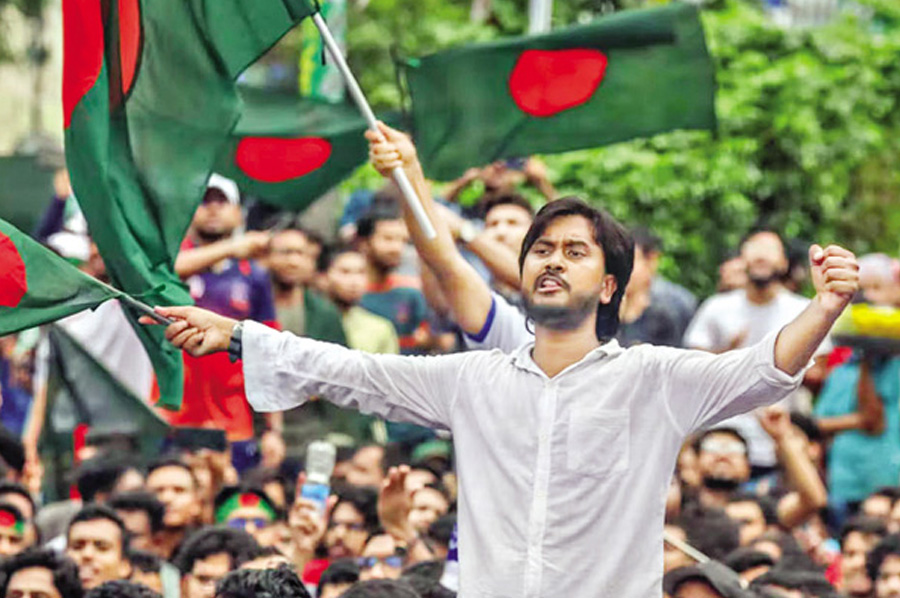
Published :
Updated :

There is apparently a broad agreement in the country that some of the most insurmountable obstacles to good governance are corruption, political nepotism and cronyism, and deteriorating law and order. This is what the citizen realise in everyday life and feels terribly frustrated about. A recent survey on youths has echoed many of these concerns, along with their expectations from the government and political parties.
Conducted by the South Asian Network on Economic Modeling (SANEM) and ActionAid Bangladesh in the wake of the July uprising, the survey focused on youth perspectives around employment, education, and the political situation. It gathered opinions from 2,000 young individuals - both male and female - aged between 15 and 35, from all districts across the country.
In Bangladesh, where nearly 30 per cent of the population comprises of youth, their perspectives are profoundly significant, embodying not just their individual hopes but the collective aspirations of the nation. Historically, the youth have led the charge during times of political and social upheaval - from the 1969 mass uprising to the 2024 movement that toppled the 15-year autocratic rule of the Hasina regime. In moments of national crisis, it is the youth who rise, challenge the status quo, and lead the way toward change.
Surveys like this, which seek to understand the socioeconomic and political perspectives of young people, are therefore crucial. Policymakers would do well to take their voices seriously, for the future of the nation depends on how meaningfully they engage with the youth.
The interim government has launched a flurry of reform initiatives and is currently engaging with political parties towards building a consensus so those could be implemented. However, one critical area remains conspicuously absent from the national reform agenda: the education sector. Although the government formed as many as 15 reform commissions, none has been dedicated to education, even though the sector suffered significantly under the 15-year misrule and corruption of the Hasina government. This neglect has not gone unnoticed. Findings from the youth survey highlight the urgency of the issue. When asked which sectors require reform on a priority basis, an overwhelming 94 per cent of respondents identified education as the most pressing concern. Nearly 73 per cent expressed a strong desire for a modern, affordable education system. The omission of education from the reform agenda not only ignores a sector in crisis but also overlooks the desire of the nation's youth, even though they have been at the forefront of the change.
Other key issues on the youth's priority reform list included healthcare (92 per cent), the labour market (90 per cent), human rights - particularly security and freedom of expression (89 per net) - and institutional reform (85 per cent). About 67 per cent of respondents expressed the need for improved and affordable healthcare services. Additional expectations among young people included a strong and independent judiciary, safety in public and digital spaces, a transparent electoral process, representative politics, and a peaceful, conducive environment on university campuses.
In response to what kind of reforms they expect from political parties to better serve the country and its youth, 65 per cent of respondents highlighted the need to end patronage, nepotism, and political violence and corruption. About 54 per cent called for regular internal elections and the establishment of democratic structures within parties. Roughly 52.7 per cent preferred policy-based politics over personality- or inheritance-based politics.
These findings clearly indicate that a majority of young people want political parties to focus on internal reforms to establish genuine intra-party democracy. Democracy is not merely about holding elections; it requires a democratic political culture rooted in transparency, accountability, and participation. The country is yet to develop such a culture is largely due to the undemocratic nature of its political parties.
So, in order to realise the aspiration of July-August uprising of building a democratic and discrimination-free country, political parties must undergo significant internal reforms and practice intra-party democracy. How they elect leaders, nominate candidates, mobilise funds, and the sources of income for party leaders and activists must be transparent and accountable. Politics must not be treated as a profession; it should be viewed as a mission to serve the public. And there should be strict guidelines prohibiting the use of students, religion or the place of worship for political purposes.
The message of the youth is clear: things must change. There is no going back. However, if key actors fail to seize this pivotal moment for change, no meaningful transformation will occur, and the profound hopes ignited by the July uprising will ultimately remain unfulfilled. So, it is imperative to utilise this transitional period with utmost wisdom and patriotic zeal, setting aside narrow self-interest, to strengthen the country's democratic future. Should the country, by any chance, revert to its old ways, the new generation stands ready to continue their fight for a better Bangladesh. All the stakeholders would, therefore, do well in taking the aspirations of young people seriously and commit to meaningful reforms, both within their own ranks and at the national level. Rebuilding democratic institutions and steering the nation toward a sustainable, truly democratic future demands nothing less than this concerted effort.
aktuhin.fexpress@gmail.com


 For all latest news, follow The Financial Express Google News channel.
For all latest news, follow The Financial Express Google News channel.